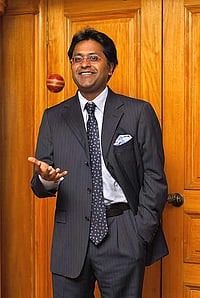Open Mouth... Extract Foot... Smile (or not)
- Be tolerant if Indians appear impolite and noisy. This is from living in chaotic cities.
- Don’t mention the American war, poverty or illegal aliens to Mexicans.
- A smiling Japanese person is not necessarily happy.
- Never mistake a Canadian for an American.
- Show care for the environment with Germans. No packaged jam at breakfast.
- Never wink at a person from Hong Kong.
***
On your marks, get set— as seven years of prep work comes to fruition, London is gripped by emotions of excitement and angst. The excitement: of holding a potentially memorable Games, and the economic windfall it promises to bring in its wake in these times of recession. The angst: can London cope with the Olympics?
A deathly fear of terrorism has hovered over the Games—and not without reason. It was a day after London won its Olympic bid on July 6, 2005, that suicide bombers attacked the city. Since then, it has been apparent that London 2012 will be a high-threat Games—making for the largest peacetime security operation in British history and turning London into a fortress. The fiasco with G4S, the private firm that failed to provide the promised number of security guards at the eleventh hour, has only added further pressure to the massive security operation with nearly 5,000 extra troops being pressed into service, apart from 13,000 Met Police officers. Professor Peter Sommer, a cybercrime and counter-terrorism expert at the London School of Economics, told Outlook, “Here, there are no second chances. There is a range of potential hostile people, wanting to make a point on any of the 200-odd countries participating.”
Being let down by G4S also means the army and police did not have a chance to undergo the extensive training and preparation required for such an event. “The extent of contingency plans is not publicised, but it is a fact that despite the skills of the army and police, it now needs to be translated into action. Without the necessary training and preparation they needed to go through, they have to be on the backfoot, no matter how good they are,” says Sommer. Keith Vaz, chairman of the Home Affairs Select Committee that’s been tasked with investigating the G4S scandal, told Outlook, “It’s very dangerous that G4S has not delivered, but now we have to accept the home secretary’s assurances.”
Every morning, Britain’s top ‘securocrats’ from Scotland Yard, MI5, MI6 and their respective government departments meet at the cabinet office in Whitehall, reviewing intelligence on threats, produced by staff working round the clock—40,000 people and at a cost of about £1 billion—to ensure a safe Games. All eventualities have been considered and secret plans are in place, with meticulous details like how many people would die if an airliner crashed into the Olympic stadium as opposed to if the plane were to be shot down over London by a high-velocity surface-to-air missile placed on two apartment complexes.
London is a fortress with almost impregnable skies. There are Typhoon jets on 24-hour duty at an airbase in outer London ready to buzz any aircraft that enters the no-fly zone; there are snipers to take out the pilot of a light aircraft and missiles on the ready to deal with anything larger. An aircraft carrier is anchored on the Thames, surveillance drones flittering in the skies and an 11-mile electrified fence around a ‘safe zone’ reinforced with squads of special forces and 55 teams of attack dogs.
While American liaison officials have scrutinised security operations, highly trained British agents have been in Pakistan working with the authorities to prevent security breaches during the Games—after reports that a crime ring in Pakistan was offering to provide fake passports and visas, and to help smuggle bogus individuals posing as members of athletes’ support teams into Olympic venues. Although the threat level is one notch lower than planned for, spies found a rise in the amount of terrorist chatter in the run-up to the Games. There also remains the unpredictable danger from cyberspace. Officials say there is a pretty high chance of ‘hacktivists’ trying to disrupt some websites attached to the Games. Have such security threats scared the athletes? An Indian athlete taking part in the Games said, “It doesn’t worry me. I only want to win a medal for my country.”

Aflame Amitabh Bachchan with the torch. (Photograph by AFP (From Outlook 06 August 2012)
The overwhelming military presence may have infused a sense of confidence to the city, but Londoners are braced for the traffic chaos. Transport for London (TFL) has warned people to avoid central London. At tube stations, volunteers began encouraging commuters to walk by handing out walking maps, ‘Why not walk it’, a week before July 27. With the Underground workers staging ‘work-to-rule’, disruptions will remain inevitable. Prime Minister David Cameron has urged Londoners to put up with the transport delays, and assured he too would use public transport. London mayor Boris Johnson, who has a lot riding on these Games, which could make or mar his political ambitions, told Outlook: “The Olympic Route Network (ORN) are a requirement of all host cities, ensuring athletes and officials get to their events on time. We have already slashed its length by one-third compared to what was originally planned and we are introducing these changes to the road network as late as possible, to minimise the impact on Londoners and businesses.”
It is clear that there is no avoiding heavy disruption as priority is given to the smooth travel of official Olympic vehicles and participants. The introduction of ORN, more popularly known as Zil lanes, created severe tailbacks. R. Kapoor, who drives to central London everyday, said, “It is very confusing, the Zil lanes are changeable, so one has to constantly look out for signs. If I don’t get used to it, I will simply have to stop driving into London.” But there are the likes of UK’s curry king Lord Gulam K. Noon, who drives across London to Southall for factory visits. He says he is proud that such an event has come in his lifetime. “It’s an international event and some hardships are inevitable, we must cooperate, I just follow diversion routes. Also, there is no squeak of corruption. We couldn’t find any Kalmadi and company here,” Noon told Outlook.
Not that there wasn’t greed about the Games. Landlords and hoteliers dreamt of making a quick buck during the event. But tenants are having the last laugh. Landlords who evicted tenants, including several Indian bankers, to earn more by renting out flats at exorbitant rates to Olympic visitors, have suffered a severe setback. A week before the opening ceremony, one dedicated website was listing more than 4,200 rooms still available in the capital. Nick Verdi, an estate agent in Stratford, said 400 would-be Olympic landlords offered their property for rent through the site, but only two dozen were successful. London hotels are also slashing down their prices. Hoteliers say people are avoiding London during this period. But figures show 4.5 million people travelling to London, a million more than the normal figure during this time of year.
Things looked bleak with economic gloom and an appalling wet summer, but the sun now soaks London. Will it be a good omen, portending a spectacular event, one Londoners can be proud of?

























